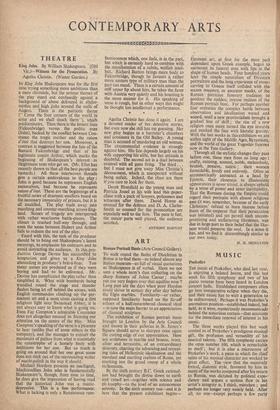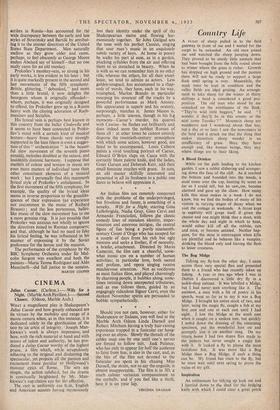MUSIC
Prokoflev THE music of Prokoflev, who died last year, is enjoying a belated boom, and this last week his fifth symphony and two of his piano sonatas have been heard in London concert halls. Established composers often go into comparative eclipse when they die, and their music has to wait a generation to be rediscovered. Perhaps it was Prokofiev's anomalous position—established indeed, but held, as it were, mysteriously incommunicado behind the notorious curtain—that accounts for the immediate renewal of interest in his music.
The three works played this last week remind us of Prokofiev's prodigious musical gift, the profusion and versatility of his musical talents. The fifth symphony carries the opus number 100, which is remarkable in itself ; but it is also a microcosm of Prokofiev's work, a piece in which the chief veins of his musical character are worked to great effect. The view that the massively lyrical, diatonic style, favoured by him in many.of the works composed after his return to Russia, was dictated by political expe- diency and argues a serious flaw in his artist's integrity is, I think, mistaken ; and perhaps no longer very widely held. After all, no one—except perhaps a few party
scribes in Russia—has accounted for the wide discrepancy between the early and late styles of Stravinsky and Bartok by attribut- ing it to the sinister directives of the United States State Department. Men naturally Mellow as they grow older and come, perhaps, to feel obscurely as George Moore makes Abelard say of himself—that no one really cares for an old monkey.
Prokofiev's monkey-vein, so strong in his early works, is less evident in his later ; but it is quite markedly present in the second and last movements of the fifth symphony. Brittle, glittering, " debunked," and more than a little brutal, it now delights the bourgeois whom it originally offended— whom, perhaps, it was originally designed to offend, for Prokofiev grew up in a Russia heavy with the cloying adoration of Rach- maninov and Scriabin. • His lyrical vein is perhaps best known in this country from the ballet Cinderella and it seems to have been connected in Proko- fiev's mind with a certain kind of musical texture—heavy brass chords very strongly supported in the bass (there is even a sugges- tion of this " orchestration " in the beauti- ful slow movement of the seventh piano sonata), melodies doubled at the octave, and insistently diatonic harmony. I suppose that matters of colour and texture in music are even more matters of individual taste than other constituent elements of a musical work ' • but I personally find this mammoth lyrical style of Prokofiev's unbalanced. In the first movement of the fifth symphony, for example, the quality of the lyrical ideas seems in inverse proportion to the grandilo- quence of their expression (an experience not uncommon in the music of Richard Strauss) ; and the less portentous, ballet- like music of the slow movement has to me a more genuine ring. It is just possible that Prokofiev was anxious not wholly to ignore the directives issued to Russian composers; and that, although he had no need to fake his lyrical feeling, he was influenced in his manner of expressing it by the Soviet preference for the heroic and the massive. The performance of the symphony by the BBC Symphony Orchestra under Sir Mal- colm Sargent was excellent and both the painists—Maria Teresa Rodriguez and Aldo Mancinelli—did full justice to the sonatas.
MARTIN COOPER



































 Previous page
Previous page